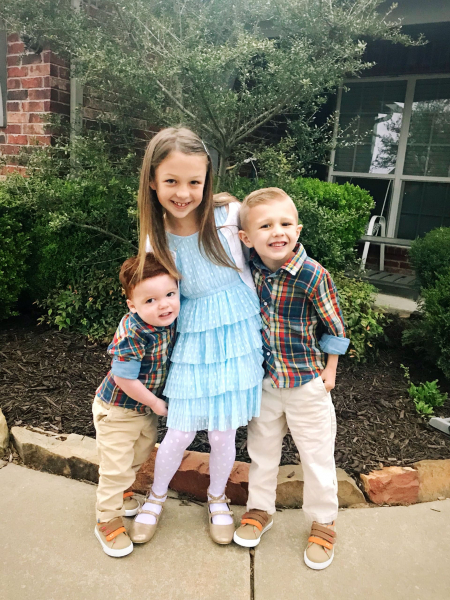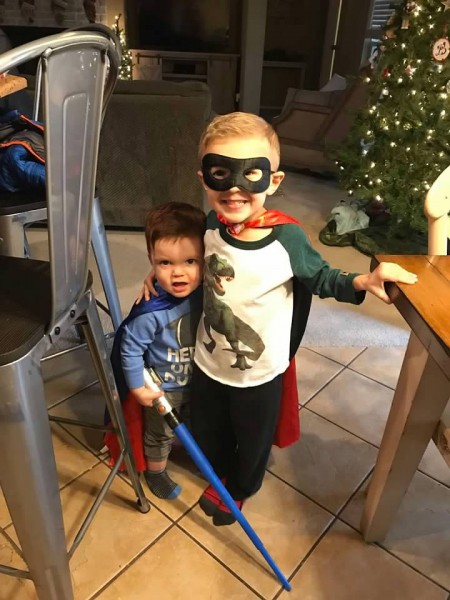But What About Your Biological Children?
One of the most common questions adoptive parents get is “What about your biological children?” It is not uncommon to have biological children when entering the adoption process. It makes me giggle to hear questions from well-meaning friends and family, assuming there’s anything they can think of that we haven’t already asked ourselves.
I’m a part of a sweet adoptive and foster support group, and I won’t sugarcoat things to say that the process for the children already in your home is rainbows and butterflies. You will talk to many families who are struggling with sibling relationships. Adoption is bittersweet, and there is a sacrifice on many sides of the adoption triad, including biological children. However, I can’t help but see the good brought to my biological children even if the process of learning some of these lessons is a little unorthodox.
1) Selfless lessons can start early.
Our decision to bring our little one home was not as much of a sacrifice as many others experience, so I won’t paint an exaggerated picture. However, I do believe our kids saw an ongoing example of putting aside our wants and desires right now to help a family in the future. In a world where it’s easy to spend more time in the car than around the dinner table, I am not sad that my children are learning that life does not revolve around them. We enjoy life. We are involved in extracurricular activities. We take vacations. But when parts of that life need to go on hold for the sake of someone who needs us more in that moment, I don’t want my children to be shocked by it. We take the time and talk to them about the why. I want sacrifice to be something they understand now so that giving becomes a part of their nature in the future. We will forfeit the vacation to save money for the adoption just like we will miss gymnastics to visit a family in the hospital. We can share our room and our toys just like we can share our time and our hearts. These lessons don’t start and end with adoption, but I do believe they play a role in showing our children that someone else’s needs should come before our wants.

2) Empathy is a gift.
I vividly remember a conversation with my oldest about the birth mother of our youngest. As we talked age appropriately of how some mothers make the brave decision to ask for help when they cannot raise their child, she responded, “I’m just so sad for his first mom. That must have been really hard for her.” Empathy is a valuable tool, and we can teach that to our children. We can see others who live differently than us, either by choice or life circumstances, and still have empathy. I want my children to see me extend love to others. I think children in adoptive and foster care homes have an earlier understanding of heartache, poverty, homelessness, mental illness, and trauma. When we brought our youngest home, my oldest said, “What’s next mom? What about the other families that may need help?” I could look at things she knows and has been exposed to and regret not keeping her safe from life’s troubles, or I can accept that these decisions we are making now are shaping her worldview to one with empathy and hope.
3) Love extends beyond just our family.
My oldest daughter’s questions made us ask ourselves the same things: Where else can we extend love? For us, the answer was respite care for foster families. This means that our kids spend their weekends differently than their friends. Sometimes we miss the birthday party to care for our foster friends. Sometimes our toys are broken, and we hear harder words in our home than we do at other times. One of my little ones received a little push from a foster friend. Once we were alone, my son asked me if his new friend pushes because maybe he’s been pushed too?

We do our best to protect our kids, but we are also teaching them that when we can give love, we do so. Not just to our family. Not just to our best friends at school. We extend love to the kid no one is talking to. We stand firm to the bully but remember they may have been pushed before too.
We traded in having sheltered kids for exposing them to the marginalized. We traded in self-centered family units to develop compassion and empathy. We reminded ourselves that our love wasn’t meant to be kept just for each other, but instead extended it to others outside of our family.
Our children and our family are far from perfect. But just like everything in life, we practice that which we want to be good at. When we practice caring for the world around us; our hope is that so will they. More than reading levels and karate practice, we want to raise our kids to be kind adults. Adults who see the hurt in the world and want to do something about it.
What about your biological children? Well, besides having the best baby brother ever, I’m hoping they also have a healthy dose of selflessness, empathy, and love.








